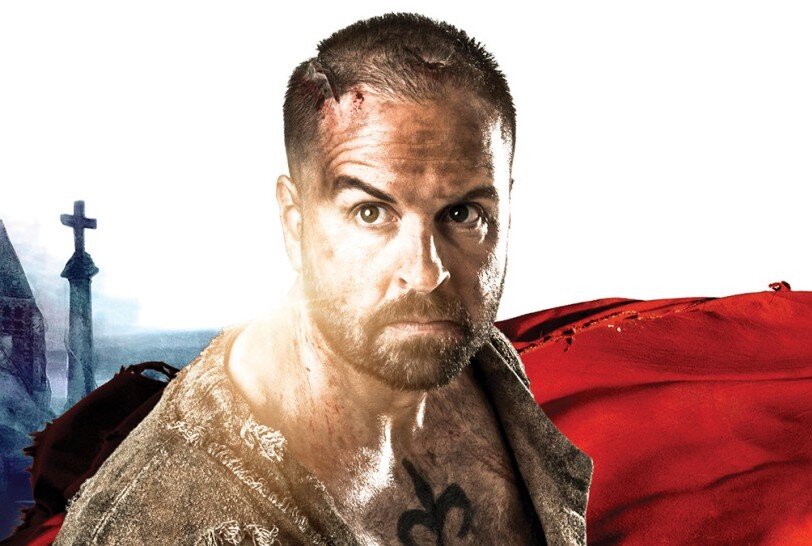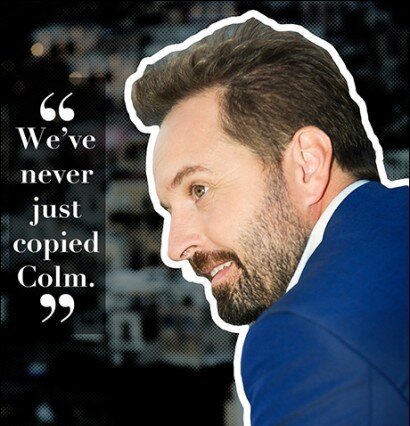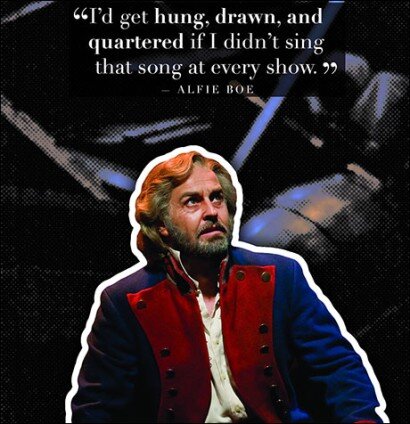


Alfie Boe returns to Broadway as Jean Valjean in the revival of Les Misérables.
By Brandon Voss
Alfie Boe has sung "Bring Him Home" at concert venues all over the world. Now the celebrated English tenor will finally sing his signature ballad on Broadway. In fact, he'll probably be singing it for the rest of his life, and that's just fine by him.
Boe famously starred as Jean Valjean in the 2010 Les Misérables 25th Anniversary Concert at London's O2 Arena, which was broadcast live in select cinemas and still airs regularly on PBS. He later stepped into the West End production of the Claude-Michel Schönberg and Alain Boublil musical for a sold-out six-month engagement. The classically trained singer, who received a shared Tony Honor for Excellence for his work in Baz Luhrmann's 2002 production of La Bohème, now returns to Broadway to succeed Tony nominee Ramin Karimloo as Valjean in the Les Misérables revival.
We spoke to Boe, 41, about when Prisoner 24601 first found him — and why the iconic character hasn't let him go since.
Playbill: After finishing your run in the West End production of Les Misérables in 2011, did you think you'd ever play Valjean again?
Alfie Boe: No, I thought that was the end of it. I thought that my Les Misérables chapter had closed.
How does it feel to be revisiting the part on Broadway?
Broadway is an amazing place. It's not just a street with a lot of shows on it — it has a real spirit, a living energy. Personally, to have done the 25th Anniversary Concert, to have performed the role in the West End, and to now have been given the opportunity to perform it on Broadway, I feel like I've ticked all the boxes with Les Misérables.
How long have you and producer Cameron Mackintosh been discussing this Broadway engagement?
We've been talking about it for a number of years, actually — when this new production was first coming to New York. But after my run in Les Misérables in the West End, my schedule's been so hectic, and trying to fit it in around my own personal tours and other commitments was very difficult. But we finally made it happen, and I'm honored.
What are the challenges of reprising the role of Valjean in a completely different production?
Well, I've been put into the role by one of the assistant directors, Adrian Sarple, who put me into the role in the original West End production. So I feel I have a personal connection with him. Adrian has a real understanding of the piece, of the way that I work, the way that I act, and the way that I deliver an emotion. We click really well.
How do you feel about the new scaled-back staging? There's no turntable!
[Laughs] I know. I actually saw this production in 2010 when it played the Barbican in London, and I was blown away by it. Having been a part of the original production, I felt a real connection to it, but I was amazed at how the new production brought a new life and breath of fresh air to the show. It has such an amazing energy. It's always nice to do a different production of a show that you've done before, because it keeps the interest going. That's why it's wonderful when new people come into the roles and bring something new to it. All the Valjeans that have been on that stage — Drew Sarich, Simon Bowman, John Owen-Jones, myself — we've all brought something new to the role, because we're all very different performers. We've never just copied Colm Wilkinson.
Besides your vocal prowess, what's something special you bring to the character?
I like to think I bring an understanding of justice. Valjean hates injustice. He can't stand bullies and he can't stand people being victimized. I really connect with that, and I try to bring that across — the protection and defense of those who can't defend themselves.
You have two young children. Has fatherhood helped to inform your portrayal?
Without a doubt. The protection that you feel over your own children is immense, and it's amazing to be able to put that feeling onstage over Cosette. In fact, my daughter wants to play Cosette when she gets a little older, and it would be wonderful to do that with my little girl. She'll probably be telling me how to act.
Has your Valjean deepened as you've gotten a little older and wiser?
Well, I've definitely gotten older. Yes, it has, but I've always connected to this role, and I do feel I understand him deeply. Honestly, Valjean has never left me. He's always a part of me. I'm always asked what roles I'd like to play in the future, but I don't have a list. All I know is that those characters find you; you don't go out to look for them. That's exactly what happened with Jean Valjean: He found me. It's a funny thing to say, as if he's a real person, because we all know he's just a fictional character in a book.
Take me back to when Valjean found you for the 25th Anniversary.
When I first got the phone call asking me if I'd like to play the role of Jean Valjean in the 25th Anniversary Concert, I was in my backyard, digging over some soil and planting some vegetables. I sort of stopped what I was doing, stood still for a while, and thought about the opportunity that had come across my path. The image that I had in my head was of me singing "Bring Him Home" onstage in front of 28,000 people at the O2 Arena in London — and being broadcast across the world. It was very exciting. I knew it would be a lot of intense work, but I knew I could do it. I threw myself into it 100%.
Did that performance live up to your expectations?
When it actually came to the moment, singing "Bring Him Home" at the O2 Arena, I was lost. I was in a completely different world. I didn't feel what I felt in my backyard, thinking of that moment, because I wasn't Alfie Boe singing at the O2. I was Jean Valjean. I was seriously praying. The song went by so fast, without me realizing it, that I couldn't hear the applause when it started. I didn't know that the song was over and that I'd finished. Then it was almost as though someone had turned up the volume switch, and the applause got louder and louder, and then I realized where I was, what was happening, and what I'd achieved. Still in the moment, I walked off stage, and one of my colleagues, Matt Lucas, who was playing Thénardier, came up to me and said, “Tonight, Alfie, a star was born.” I turned to him and said, “Oh, who's that?” [Laughs] But I was basically just doing my job, and it felt great.
That performance changed the trajectory of your career. You got a major record deal with Decca and haven't stopped touring since. Is "Bring Him Home" always on the set list for your concerts?
I'd get hung, drawn, and quartered if I didn't sing that song at every show.
Do you never tire of it?
People often ask me if I'm sick of it by now, but it's one of those songs you never get sick of. You can't get tired of something that beautiful. It's part of me. It's part of my life. It's been so good to me, so I have to give it the justice that it deserves every time I sing it.
What was your introduction to Les Misérables?
I was 14 years old, in Lancashire, England, and I was taking part in my local amateur operatic society's production of Songs From Shows, which was our performances of songs from West End musicals. We performed "Do You Hear the People Sing?" I had one line to sing: "Will you join in our crusade? Who will be strong and stand with me? Beyond the barricade, is there a world you long to see?" But I was so nervous that I actually was sick at the back of the stage before I had to run down to the front to sing! Then I got to know the score, and I loved it. I had, like, a Les Misérables greatest hits album. My sister had bought the [sheet] music, so I looked at a few of the songs, and in one of those other amateur productions, at the age of 16, I sang "Bring Him Home." That was the first time I ever sang it, and that was a moment for me. Looking back now, it's interesting to think about singing that song so many years ago — and how different I sing it now.
What appeals to you most about the score?
What's beautiful about Les Misérables is that everything that a performer sings and acts in this piece is directed by the music and dictated by the instrumentation. All you need to do to understand the emotion is to listen to the score, and that's what Claude-Michel Schönberg and Alain Boublil have done perfectly — every emotion is written on those dots in the music. As Valjean, I try to connect personally with the emotion of the music and portray each emotion that the music plays out.
Your background and training is in opera. Were you always a musical theatre fan?
I was. I first discovered musical theatre at a very early age. My parents were big fans of music in general, and they listened to a lot of Rodgers and Hammerstein. I took part in an amateur production of West Side Story as well. It was a real eye-opener for me.
Had you seen a Broadway show before you quit your training at the Royal Opera House to play Rodolfo in La Bohème on Broadway in 2002?
I hadn't. In fact, that was my first trip to New York City. I'd never been to America before. I was so excited. I'd been dreaming of coming to America since I was a kid in Lancashire in the north of England, walking along the beach, looking out over the sea, and thinking that just over the water was America — a new life, a new world, and all that. Then I realized I was looking in the complete opposite direction; I was actually looking at Northern Ireland. [Laughs] But I'd always, always wanted to get to America, so when I finally had the opportunity, I was like a kid in a candy shop. Now, every time I come to New York, it fills me with that same energy.
Have you been eager to return to Broadway?
It's funny, because I asked my agent at the time to get me an audition when they were bringing the original production of Les Misérables back to Broadway in 2006. The agent said to me, "Oh, I don't know. It's a difficult show to get auditions for, and I'm not sure there's anything in it for you. You're a little old for Marius, you're too young for Javert, I don't think you're an Enjolras, and you're definitely not a Valjean." Many years later I sent him a DVD of the 25th Anniversary Concert.
I know that you met your wife while rehearsing La Bohème in San Francisco, but what else stands out in your memory about your first Broadway experience?
Working with Baz Luhrmann was amazing. He's a magical director and a great friend. His energy is beyond belief, and he brought so much life to the show. He was proud of what we'd done, and we were so proud working with him. It was a very exciting time, and the show was received very well. Then, unfortunately, we hit some hard times during the run. First, we had a horrific winter. Then we had a musicians strike and a stage crew strike. And then the war in Iraq broke out, and people stopped coming into the city. The producers lost money on a number of shows, and we had to close [after seven months]. It was a huge cast and a huge orchestra, so it was an expensive show to keep running. But I'm very proud of what we achieved with a wonderful piece like Puccini’s La Bohème.
I've read that it wasn't a very lucrative gig. What do you remember about living in New York during that period?
It was an interesting time. I was living in a beautiful apartment building, the Ansonia on 73rd and Broadway. They should make a musical about the Ansonia, because there are some very interesting characters living there. But my apartment was the size of a shoebox, literally 9 feet by 6 feet, so we spent most of the time in the hallway. We slept on an air mattress that we had to plump up every night at 4am after it had deflated slightly. We had a cardboard box as a bedside table covered with one of my wife's scarves, and her reading lamp was the light from the small mini-fridge. So it was a bit of a bohemian life itself. But it didn't tarnish our excitement and joy to be in New York. We developed a great community of friends that we still keep in touch with, and we hold those times on Broadway very close to our hearts.
Now that you're returning to Broadway as an international star, I imagine your living conditions are a little more high-end this time around.
Yes, my apartment is very nice. I must say that Cameron Mackintosh has looked after me very well.
You auditioned and were seriously considered for Valjean in Tom Hooper's 2012 film, but the part ultimately went to Hugh Jackman. How do you look back now on that whole situation?
I'm hugely disappointed, and I hate Hugh Jackman! [Laughs] No. Now that I'm returning to Les Misérables after five years, it's wonderful to see what Hugh did for the role. He's a fantastic actor, without a doubt, and he's a great singer, so he deserved a crack at it. I'm not disappointed whatsoever. Yes, it would've been fantastic to play the role in a movie, but, you know, Hollywood producers are a bunch of bastards. I've seen the film and it's a great achievement. I'm very pleased for Cameron and the composers that one of the triumphs of their careers was made into such an epic movie.
Much like Jackman's, Ramin Karimloo's Valjean is pretty ripped. Have you been putting in extra hours at the gym?
Well, my body's already perfect, so I don't really need to work out. [Laughs] It is good to have that physique, but you have to start deeper than that with this role. There has to be more of an emotional connection than a physical connection, so that's where I start. But I have been working out six days a week and taking this opportunity to get myself feeling fit and healthy. I also stopped drinking about a year ago, so I feel great. Besides, Ramin's muscles are all stick-on, you know. He takes them off at night.
Playbill.com, August 2015.
